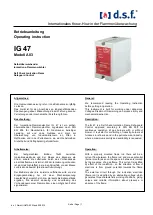
29
17. Emergency operation (only 11-22 kW)
If the pump has stopped and it does not restart after you have
gone through normal remedies, the reason could be a faulty
frequency converter. If this is the case, it is possible to establish
emergency operation of the pump.
But before you change to emergency operation, we recommend
you to check these points:
•
check that the mains supply is OK
•
check that control signals are working (start/stop signals)
•
check that all alarms have been reset
•
make a resistance test on the motor windings (disconnect the
motor conductors from the terminal box).
If the pump still does not start, the frequency converter is faulty.
To establish emergency operation, proceed as follows:
1. Disconnect the three mains conductors, L1, L2, L3, from the
terminal box, but leave the protective earth conductor(s) in
position on the PE terminal(s).
2. Disconnect the motor supply conductors, U/W1, V/U1, W/V1,
from the terminal box.
3. Connect the conductors as shown in fig. 39.
Fig. 39
How to switch an E-pump from normal operation to
emergency operation
Use the screws from the mains terminals and the nuts from the
motor terminals.
4. Insulate the three conductors from each other by means of
insulating tape or the like.
Warning
Never make any connections in the pump
terminal box unless all electric supply circuits
have been switched off for at least 5 minutes.
Note for instance that the signal relay may be
connected to an external supply which is still
connected when the mains supply is
disconnected.
T
M
03
86
07
20
07
TM
03 912
0 340
7
TM
04 00
18 48
07
TM
03
91
21
34
07
T
M
03
91
22
34
07
TM
03 912
3
340
7
Warning
Do not bypass the frequency converter by
connecting the mains conductors to the U, V and
W terminals.
This may cause hazardous situations for
personnel as the high voltage potential of the
mains may be transferred to touchable
components in the terminal box.
Caution
Check the direction of rotation when starting up
after switching to emergency operation.









































